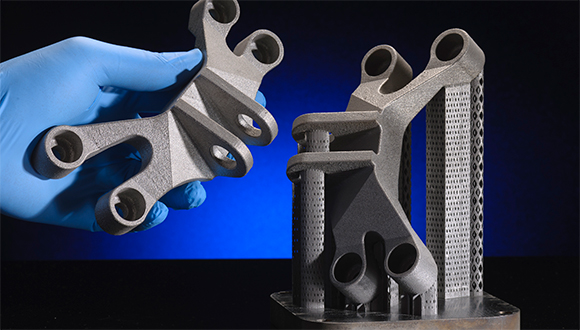Thu, 11 March, 2021
PhD Studentship - Evaluating fundamentals of environmentally-assisted cracking of additively manufactured materials
- Sponsorship and industrial supervision from TWI Ltd and the Additive Manufacturing Innovation Centre (AMIC)
- Postgraduate programme management by NSIRC
- Awarded by and academic supervision from Lancaster University
......
Why is this research needed...?
Additive Manufacturing (AM) technologies are rapidly maturing, and while basic properties, such as strength and impact toughness, are widely reported, the environmentally-assisted cracking (EAC) behaviour is largely unknown.
EAC mechanisms, like stress corrosion cracking and hydrogen embrittlement, are insidious failure mechanisms which occur where a susceptible microstructure is combined with a corrosive/hydrogen charging environment and stress, potentially leading to catastrophic failure and loss of life.
Research is urgently needed to establish if AM materials behave similarly to traditional materials in terms of EAC mechanism(s) and therefore identify if standard approaches to prevent these failures are appropriate for AM components.
What will this research project involve...?
This topic is a collaboration between TWI and Lancaster, and will characterise the EAC behaviour of AM deposits produced by powder bed fusion processes and industry standard materials like 316L stainless steel and nickel Alloy 718. Manufacturing parameters and deposits will be selected to produce materials considered representative for the consumable and process.
The doctoral student will have the opportunity to explore the relationships between microstructure and environmental crack susceptibility by carrying out a range of corrosion tests in environments, where these materials would typically be considered to be susceptible to EAC. Throughout the programme, environmental testing will be coupled with pre and post-test advanced characterisation. A ‘safe operating envelope’ will be established for each material and compared to industry experience of wrought/cast equivalents.
Test coupons will be extracted from bulk components and witness specimens will be directly deposited using each AM process to evaluate if witness specimens (deposited next to a component) are representative of the cracking behaviour observed in actual AM parts.
Intended project objectives include:
- Identify if EAC mechanisms observed are consistent with equivalent wrought/cast materials;
- Propose necessary adjustments to industry standards and standard test procedures necessary for AM materials/parts;
- Publish environmental testing data necessary to give industry confidence that current/new approaches are appropriate for AM material;
- Develop a mechanistic understanding of EAC in AM materials.
- Identify if witness specimens deposited next to AM components are representative of actual parts, in terms of EAC susceptibility.
 Photo courtesy of TWI Ltd
Photo courtesy of TWI Ltd
Tell me about Lancaster University...
Lancaster University is one of the UK’s leading research-intensive universities consistently ranking no.1 in the North-West of England and recently 137 in the world. It was the last of seven new UK universities conceived in the 1950s with 2014 marking its 50th Anniversary.
The university's 12,000 students belong to one of nine colleges, which act as interdisciplinary communities, but are taught by four academic faculties: arts and social sciences; health and medicine; management; science and technology.
Lancaster has created and established a world-class multidisciplinary Engineering and Data Science Institute (DSI) that aims to set the global standard for a truly interdisciplinary approach to contemporary data-driven research challenge. The DSI aims to act as a catalyst for the field of Data Science and to provide an end-to-end interdisciplinary research capability - from infrastructure and fundamentals through to globally relevant problem domains and the social, legal and ethical issues raised by the use of Data Science. Conducting research across the following three themes (1) Environment, resilience and sustainability, (2) Health and ageing, (3) Data and society.
What is the Additive Manufacturing Innovation Centre...?
Lancaster University Engineering Department (top 10 UK University) recently set up the Additive Manufacturing Innovation Centre (AMIC). AMIC is a strategic partnership between Lancaster University and TWI with the aim of developing a comprehensive research capability focused on combining additive manufacturing with artificial intelligence and machine learning, also looking into new material approaches and processing. It will also be developing initiatives to certify Additive Manufacturing for serial production underpinned with academic research excellence with an industrial context.
The centre brings combines the expertise of TWI and Lancaster University to develop the international research profile and reputation of both partners in relation to AM, including the complete value chain of design and build optimisation, prototyping, performance validation and product industrialisation.
What is TWI...?
TWI is a world leading research and technology membership organisation. It has headquarters in Cambridge, but also facilities across the UK, South East Asia, China, Australia, Central Asia, India and the Middle East. TWI runs the day-to-day management of NSIRC and has over 800 staff providing technical support for technologies such as material science, batteries, industry 4.0, advanced manufacturing, artificial intelligence, structural integrity, NDT, surfacing, electronic packaging, cutting, welding and many more.
The organisation is internationally renowned for its multidisciplinary teams that implement established or advanced technology solving problems at any stage – from initial design, materials selection, production and quality assurance, through service performance and repair. It's research council govern the technology focus of NSIRC, and any member of TWI has a say in the research strategy for the centre.
 Cambridge, UK. Photo: Unsplash
Cambridge, UK. Photo: Unsplash
What are the candidate requirements for this PhD...?
Candidates should have a relevant degree at 2.1 minimum, or an equivalent overseas degree in materials science, physics or chemistry, preferably with a focus on metallurgy, corrosion or environmental testing. Overseas applicants should also submit IELTS results (minimum 6.5) if applicable.
A funded PhD
Funding availability to students worldwide.
-
Other articles from NSIRC